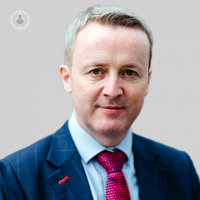Post-viral fatigue and COVID-19
Written by:We are all only too aware of the potentially devastating consequences of infection with the novel coronavirus COVID-19. Currently, there is little else on our TV, radio news programmes and in the newspapers. But among survivors, we are increasingly hearing about some people experiencing severe post-viral fatigue symptoms. We asked Consultant Rheumatologist and Fatigue Specialist Dr Gerald Coakley for his views.

What has your experience been of COVID-19?
So far I have been lucky enough not to be infected by the novel coronavirus COVID-19 but many of my colleagues have. Like most of us in the NHS, during the peak of the UK epidemic in March and April 2020, I was asked to stop doing my regular outpatient specialist work and was instead allocated to an inpatient ward as one of two consultants in charge. I looked after some critically ill patients who went on to spend weeks ventilated in the intensive care unit and some, sadly, did not survive. Although it was such a joy when we saw many people recover and return home to their families.
Increasingly though, we are hearing reports of people initially feeling understandably elated at having survived a potentially lethal infection but then, from week 3 or 4 onward, developing overwhelming fatigue and muscle pains. This seems to occur in only a minority of patients but is a striking feature of the condition. As someone long interested in post-viral and chronic fatigue syndromes, it has been fascinating to see both the acute phase and the post-viral problems in the same patient – an experience I have very rarely had before as I usually only see people months or years after the initial viral infection has been managed by others.
What do we know about the biology of post-COVID-19 fatigue?
Sadly, we know almost nothing because it is a brand new infection. But we do know about a related coronavirus, SARS, of which there was an outbreak in 2002. Dr Harvey Moldofsky at the University of Toronto conducted studies into the ongoing health problems of some people who were diagnosed with SARS. He recruited 22 people who had not been able to return to work for an average of 19 months after the illness and found that the symptoms of chronic post-SARS form a syndrome which includes chronic fatigue, pain, weakness, depression and sleep disturbance. Dr Marco Lam and colleagues at The University of Hong Kong found that 40% of SARS survivors experienced symptoms of chronic fatigue following the illness and 27% were classified as having chronic fatigue syndrome (CFS), also referred to as myalgic encephalomyelitis (ME).
Whether we will see similar statistics with COVID-19, only time will tell. But this may indicate the kind of ball-park figures we could reasonably anticipate with about one-third of people experiencing clinically significant post-viral fatigue.
How should people infected with COVID-19 manage the acute phase of the infection?
Guidance is constantly changing as we learn more about the condition. I would always advise people in the UK to consult the latest advice from the NHS.
Fortunately, the COVID-19 infection is a mild to moderate problem for the majority with recovery occurring over the course of a week or two. It should be aided by rest, good hydration and regular Paracetamol.
What guidance can you give for people in recovery to minimise their risk of developing post-viral fatigue?
When people are starting to feel better, it is tempting to engage more fully in work, leisure and social activities. It is crucial that this is done slowly. It is good to start with some degree of activity but really important that this is done in a slow, gentle manner and is increased gradually. People should do their best to resist pushing through fatigue and do activity in manageable chunks. Keep expectations low and listen to how your body copes with this transition. It is better to stop before you get tired.
What about exercise?
Some exercise can be helpful. This might be stretches or short walks (while carefully following government guidelines on the duration and social distancing) but for people who usually do a lot of exercises, it is important to only do a fraction of what they normally would because over-vigorous exercise can actually set recovery back. Resume slowly; gradually increasing time and exertion levels.
How should people manage the return to work?
Often, people want to get back to work straight away once severe viral symptoms have settled. This is often not a good idea because a serious infection like COVID-19 takes more out of us than is obvious and even after the fever and cough have settled, it can be weeks before the body returns to full health. I advise people in this situation to speak with their employer and ask for a ‘phased return to work’ to help build up slowly. For example, some of my medical colleagues found they were exhausted after lunch so they started working three mornings per week. Then, gradually building up to five and then only once they managed that consistently did they increase to do afternoon work and build up to normal full-time hours.
Most workplaces have such phased programmes as part of their sickness/absence policies and procedures. There might also be parts of the job that are more draining and in this case, it makes sense to ask whether these can be changed temporarily. GPs are able to provide a ‘fit note’ setting out the limitations. It is crucial that any activities (including work) are done gradually and the best guidance is to always do less than you think you can!
What about people whose fatigue does not improve with the measures you have outlined?
It can take many months to recover fully. However, if there are persistent fatigue symptoms after four months that interfere with the capacity to carry out normal day-to-day activities and/or work, then I recommend a visit to the GP for further tests and to consider referral to a specialist fatigue service.
Be sure to read this document 'How to manage post-viral fatigue after COVID-19' by the Royal College of Occupational Therapists (RCOT) for practical advice.
Dr Coakley has had helpful advice and support in managing post-viral fatigue patients and in thinking about post-COVID fatigue from the expert multi-disciplinary team at Vitality360.
Click here to get in touch with Dr Coakley and to receive care of the highest quality for chronic fatigue syndrome, fibromyalgia, rheumatoid arthritis, back pain and many more conditions.


